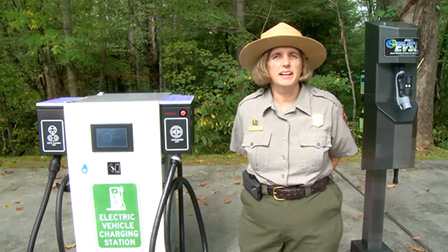Dec. 29, 2015
Smoky Mountains Leads the Way in Implementing Alternative Fuels (Text Version)
This is a text version of the video segment Smoky Mountains Leads the Way in Implementing Alternative Fuels, which aired on Dec. 29, 2015.
JONATHAN OVERLY: Hello. I'm Jonathon Overly, Executive Director of the East Tennessee Clean Fuels Coalition. On September 30, 2015, the Great Smoky Mountains National Park held two ribbon cutting ceremonies to celebrate over ten new pieces of alternative fuels equipment. These milestone events were held at the Oconaluftee Visitors Center near Cherokee, North Carolina, and at Sugarlands Visitors Center near Gatlinburg, Tennessee, and celebrated the implementation of three new facets of the park's climate-friendly parks program in partnership with its two neighboring DOE Clean Cities coalitions, the East Tennessee Coalition and the Land of Sky Clean Vehicles Coalition. The park implemented propane auto gas vehicles, electric vehicles, and electric vehicle recharging equipment to improve air quality in the Smokies.This equipment included five gasoline powered mowers that were converted to run on propane auto gas. The new mowers performed so well over the summer of 2015 that the park has already purchased two additional propane powered mowers. The second facet of this project was the purchase of three new low-speed electric vehicles for use in specific park areas like campgrounds. These vehicles replaced larger gasoline vehicles and emit zero tailpipe pollution in the park. Last but certainly not least, the Smokies became the first unit in the National Park Service to install and operate two kinds of EV recharging equipment at the Oconaluftee and Sugarlands Visitors Centers.
CASSIUS CASH: Today is a very historical moment as the Great Smoky Mountains National Park is the first unit in the National Park System to have DC charging stations. This is very important as we enter into our second century of service. We not only feel it is to be - remain relevant with the next generation but we feel that technology like the DC charging stations is a way that we can have zero emissions and make sure that we do our job in making sure that we reduce carbon dioxide in our atmosphere.
JONATHAN OVERLY: So the installation of this equipment in the Smokies does not only help the park leave a smaller footprint, it allows the public to join in the effort. In addition to the new vehicles and equipment, the park has also added signage in certain parking areas reminding visitors not to idle their cars and buses unnecessarily.
BILL EAKER: So we're thrilled to be part of such a unique and effective program that involves all levels of government and the private sector all working together toward a common goal. The Great Smoky Mountains National Park has become a leader in this effort and we are pleased to have partnered with them to green their fleet.
SUSAN SACHS: Well, air quality is one of the biggest issues impacting park resources in Great Smoky Mountains National Park. While we've had a lot of improvements with reductions from coal burning power plants, there's still a lot of points - non-point sources which would mostly be people in their cars. So the more we can do to educate people about cleaner vehicles and reducing emissions, like having electric vehicle charging stations in the park, the better example we're setting for the visitors.
JONATHAN OVERLY: Tennessee-based Nissan USA was instrumental in the successful implementation of this project through their generous donation of the two DC fast chargers.
CORNELIUS WILLINGHAM: Nissan is very pleased to be a part of this great initiative to bring electric vehicle charging to the Great Smoky Mountains National Park. As the builder of the Nissan Leaf, the best selling electric vehicle in automotive history, built right here in Tennessee, we believe that electric vehicle charging is the wave of the future and bringing it to this area is going to make it much easier for people to bring - to come to the park, enjoy the natural outdoors with zero-emissions driving.
JONATHAN OVERLY: The installation of the DC fast charging equipment donated by Nissan enables electric vehicles of all types to visit the Great Smoky Mountains National Park, the most visited national park in the country.
BARBARA HATCHER: Hi, I'm Barbara Hatcher. I'm a civil engineer here at the Great Smoky Mountains National Park. I'm here to tell you about our new charging equipment that we have. I'll start out with our Signet unit, which is a DC fast charger. With this unit on our CHAdeMO side we can charge a Nissan Leaf and we can charge a Tesla with an adaptor. On our CCS Combo side we can charge a BMW I3 and any future American-made cars.
JONATHAN OVERLY: One other local partner who worked with us on the project was the Black Bear Solar Institute located in Townsend, Tennessee.
BOB HARRIS: Well, to me the most significant thing about being here today with the first DC Fast chargers in any national park in the United States is how it opens up the park to all the visitors coming in with their electric vehicles. Instead of spending hours recharging after crossing the mountains here, going up to the highest points in the Eastern United States, they can recharge in 20 minutes and continue their trip and enjoy the park.
JONATHAN OVERLY: This milestone event represents the beginning of a new era in the Smokies, allowing electric vehicles to reach and drive around the park and preserve the natural beauty and clean air for wildlife and visitors. Thank you to all the project partners who helped make the Smokies a leader in the support of alternative fuels as they approach 100 years of welcoming visitors from all over the world to enjoy the pristine beauty and splendor of the Great Smoky Mountains.
